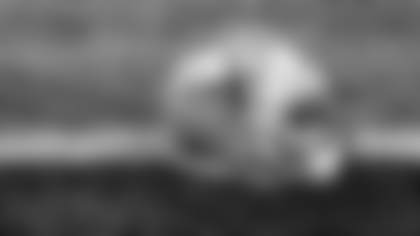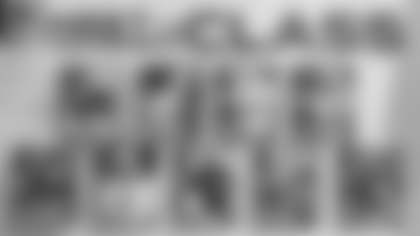New Orleans Saints Head Coach Sean Payton
Post Draft Press Conference
April 27, 2013
Opening Statement: "Right now we are spending a lot of time just going through and preparing for the next phase of this which is signing (undrafted) free agent players, that'll take place right after the seventh round concludes. I think it has been an important part of the process for us every year we just try to go through, every year there are about 40-50 players at least that make rosters so there will be a lot of phone calls, a lot of recruiting going on here pretty soon."
What did you guys see in a guy like Rufus Johnson?
"One of the things we try to do in the later rounds is look at size, speed and some measurables, we were able to do that with guys like Zach Strief or Marques Colston. He is someone that has that stature, smaller school, he is a player that once the season was over with, he played one of those all-star games and opened up some eyes, but he has those physical stature that you are looking for. We feel like he is a guy that can rush the passer really well. so he can line up one of those outside positions and we will see how he develops. You are looking for some traits that stand out and with him clearly that was the case."
Rufus became very emotional talking with us, what is it like when a player is that overcome with emotion?
"I think it is one of the neat things about the process is the actual phone call with the drafted player, really from the first round on, you get a wide range of emotions. You really never know what to expect when you make that phone call, in each case it's different, but it's part of the process. They have been through a lot hard work, they have been through a lot of expectations in regards of when, so sometimes it can be disappointment maybe because they weren't drafted earlier but I think by in large it's always a positive response, there are generally family members there and generally, it's the end of the process as far as their wait, but it varies. I don't know if I would describe the conversation I had with him being the same way. It was excitement; you could hear the excitement there. At that moment there is some clarity for the player in regards to where he was going to go."
Sum up the last few days for the draft
"I think a few things, I think number one we paid attention to the measurables and if you look at each player, their size, their speed (fits what we want). With the defensive players, it's the stature, even with the left tackle (Terron Armstead) offensively there is athleticism in someone who really did a good job, not only on tape but in regards to skill set, in regards to the way he tested. The same way with the receiver (Kenny Stills), he is someone that runs exceptionally well, he is fluid, and then I think at the very beginning of the draft with Kenny Vaccaro, there is a real good background or body of work the way he plays. So I think that process for the next two weeks where they get ready to come here for the rookie minicamp (will be beneficial). I think what is going to take place here in the next couple of hours (undrafted free agent recruiting), it's still not over yet. I think this is always an exciting time of the year because you are bringing in new players to your roster, and for me I mentioned this to the staff, when you miss one season, you miss that phase if you will, that element of that 15-20 new faces, be at free agency or draft, and then we are in that second phase where we have players that I see or run into that I haven't really spent that much time with or probably wouldn't recognize by name yet. That'll, over the course of time, get figured out, but it's always good for the organization and you are always hopeful that this is one of those classes that you can look back on and look at as a building block of what you are doing and what you are trying to do."
Was there every a point in time for some reflection that you didn't get to go through this last year?
"I don't know necessarily during the draft, we were talking about the upcoming rookie minicamp and then the OTAs and the veterans minicamp, and two years ago there was a lockout and so this upcoming offseason of OTAs and minicamp it will be three years really since the last time I was involved in that. We are number one glad to have our players back in the offseason program, our attendance has been outstanding, 100 percent, and that's encouraging to see these guys working hard and now we have a group of new players that we are going to bring in the locker room, it will be very competitive and these players will figure that out very quickly. You are always excited and anxious to see how they respond to that challenge."
What are some of the checklists of some of the undrafted guys you are looking to bring in?
"What we would typically do, right now in the draft room there would be the depth chart, offensively and defensively with the current roster, current draft picks, and there would be a series of magnets and then we would take grey or black magnets that represented unnamed players and stack them behind certain positions. The tight end right now might have one or two magnets behind them, the receiver may have one, there might be a few magnets inside guard, maybe one at right tackle, running back there may be one, quarterback one, and then you do this throughout your depth chart and your numbers equal 90. Now that being said, if there is a highly graded player at a position where you don't necessarily have a magnet, that wouldn't keep you from recruiting and trying to sign that player and then you might have to be one heavy there or make a decision there, but you are still paying attention to the grade in trying to bring in the best group of free agents as opposed to 'just needing this linebacker'. There are players to get at every position. The trick, or hopefully the challenge is to find guys. Do they play special teams? What unique thing do they do to make them compete for a roster spot? That's what is going to take place here and is taking place right now."
You don't always need four quarterbacks, but do you definitely want one?
"The only reason why, when the roster at training camp was 80, you saw a lot of teams, including ourselves, just going in with three. When it's at 90, you can go in with four, so it'll just be where are we at with the other numbers. It's not a prerequisite."
What did you like about Kenny Stills?
"He is fluid, fast, has been productive, has played at a high level of competition and can run. He is six foot, lean the way he is built, but I think he has good transition with his speed. A lot of times when you get someone that can run as well as he does, maybe he doesn't transition as well, his speed and his production are things, the two immediate things that come to mind."
Is that something you wanted to add, another speed guy?
"That was not necessarily a must or something we had gone into this process with but I think when we got to that selection we valued his skill set."
You have never drafted a receiver under six feet tall, in fact this is the first guy you have drafted that is right at six feet, is that a coincidence or not?
"No, that's not, it's intentionally, I just prefer bigger receivers. Now it is not a mandate though, if the player is exceptional in some different areas, then that won't eliminate him. Lance Moore plays an important role for us and he's under that benchmark, but when it comes to looking for, if you listed some of the measurables you are looking for, it would be that in a receiver, size, length, height, there are just so many contested plays that the larger target ends up on the better end of a lot of plays and it's the same way for corner sometimes. "
How much does your history of hanging on to undrafted guys, how much does that help in this time of recruiting?
"I think it is our number one pitch. We try to educate early in the process, not only the players but also the agents. Look at the rosters and see, find teams that truly will pay attention to or have a history of signing free agents. Our philosophy is this process that we have just gone through is the method to which we procure or basically get players to come here. We have to draft them at a certain value point, but once all of that takes place, to us how they got here shouldn't be important. Once they get here, it's what they do and I think that the locker room understands that, I think it's good for the locker room and I think the players and hopefully the agents. But it is a big pitch of ours that once you get here you aren't in a different locker room, you're a part of our team, competing to make the team. We have cut draft picks and kept free agents in that same year. We are looking for the best guys so hopefully that helps us, I think it does. I think there are two things they look at closely; I think they look at the depth charts, so there are some positions where it is hard to attract a player. I can recall several years ago at this time on the phone with the running back at Houston, Arian Foster, and he was in, he's coming, signed, sealed, delivered, he didn't sign yet but he basically said he was in. And then half an hour later, he called back and he made a good decision, it wasn't the decision I wanted him to hear but he began to look at the depth charts of several teams and said wait a minute. I think the agents and the players pay close attention to the stack when they make these decisions, as they should. I think the fit and the history, I think they have learned, I don't know if all of them have, but the difference between a $3,000 bonus or $7,000 is very, it should be one of the last things considered when making this decision because ultimately the goal of every one of these players is to make the roster and have a chance to be on a team."
You haven't re-signed Devery Henderson and you drafted a wide receiver today, does that mean you are deciding to move on?
"Well, no I don't know that I would say that, I wouldn't say that the door has been closed because we drafted a receiver today. I think that that's something with him, I think might be sorted out sooner than later. As he became (a) free (agent), I think there are a handful of players in this league, veteran players in this league that are still unsigned, good football players that I think often times will wait till after the draft and for instance if you are a team that had a need at receiver and you weren't able to fill that need during the draft, you might go back to the pro board. I know we do that every year and begin to look, where we weren't able to get this in the draft so there is this second wave,, of paying attention to how do you fill a need. So I think sooner, rather than later we will get a feel for that."
Looking at Isa Abdul-Quddus and Rafeal Bush, do you think they made enough progress where they would be involved in a competition at safety?
"Well they are here and I know Abdul-Quddus a little bit more than Bush. I think they are going to have those opportunities. In the spring it is more mental and it's more geared toward preparing for the training camp, which is where we are going to get in the competition, but I definitely think so. I think it starts with what do you bring to the table in regards to not only safety play, but those guys that aren't starting and I'm not suggesting that they aren't starters, but the guys that aren't starting have to be good on special teams. You look around the league and the backup safeties, corners, linebackers, receivers, these guys have to, when we sit down and put the roster together, we have to be able to say here is our vision for this player if he is the fourth safety and it is x amount of snaps in the kicking game, he can play in the nickel, as long as we have a vision. So I think that is something that is important, but to answer your question yeah they are going to have opportunities and they are not going to just be guys that are in here for training camp, they are going to be competing just like those front line guys are and we will go by what we see."
Was Josh Lucas your primary scout on each of these guys you took?
"I don't know that he was the primary scout. With his role now in our department, it's not just regional but he will also oversee a lot of these players, but it varied depending on region. My mind right away is going to what region these guys are from, but there are two or three scouts that probably have seen or crossed check more than the rest and he would be one of those scouts."
What makes you think Rufus Johnson's ability can translate to the pros?
"When he played in the "Texas vs. The Nation" game, you saw him in a little bit of better competition. It's always hard to take the small school player and project how he's going to do. But we saw some signs with his pass rush. You certainly see his size. We'll see. I'm anxious to see."
Do you look at the rookie minicamp as more of an evaluation, orientation or mixture?
"I think the minute they arrive, there is some evaluation and learning. I think our goal at that point in that rookie camp is to give them an introduction to how we practice, how we teach, how we install meeting rooms to the field (transition), the tempo, and to prepare them for what are going to be the OTAs in May and the minicamp in June. That process of evaluation begins the day they arrive here. We can evaluate how they're doing and learning. I think, ultimately, it's preparing them. The mistake that we can make is putting in too much or trying to do too much, which prevents the player from playing as fast as he can to get a true evaluation on the player. I think those early camps for the rookies are very vanilla, but they are intended to be."
Can you remember somebody coming in to rookie camp and making you say "Wow"?
"I said this yesterday that the very first rookie camp in 2006, Marques (Colston) really struggled. The receiver out of Oregon State, (Mike) Haas, was running all over and catching the ball. If you just watch that first rookie camp, you would've had the other player making the team and Marques not. You have to be careful to be patient. You're trying to prepare them to allow them to put their best foot forward so that you can get a true evaluation on their strengths and weaknesses. You don't want to instantly evaluate and make conclusions. But those impressions are important. Are they in shape? The challenge these players face is that they do so much postseason work and travel and visiting teams that it is hard for them to stay in a training regimen. The higher draft picks especially, they want to be in shape but yet they are traveling. The impressions are important and it begins the process."
Can you talk a little bit about your success with small school guys in the past?
"I have been trained that real good football players have come from everywhere. Certainly, more of them come from the larger colleges. The better high school recruits end up at the bigger schools. When you see LSU, Georgia, Alabama or Michigan, some of these schools have seven or eight or nine guys in the last three days that are going to be on a training camp roster. Just as it is for us, there is no science to this draft. The same exists in the recruiting process. The players slip and end up at other schools. The bigger challenge is always trying to evaluate how they're doing versus that level of competition. When we watched (DJ) Fluker go against (Barkevious) Mingo, you kind of get the chance to see what we think is a pro right tackle up against a pro end or outside backer and you kind of get an easier evaluation. Watching (Terron) Armstead go against a guy that might be selling insurance in two months is a harder evaluation. We hope that they dominate that level of competition. They stand out on the tape, I think that's a better word. That would be the challenge in scouting the other schools. But, every year we see it and we don't purposely set out to look for that player. But, each year, if we feel like the grade matches the round then we're not afraid of that."
Malcolm Jenkins said you gave him a heads up about drafting Kenny Vaccaro. How did you go about handling that?
"We were speaking about this first pick, and I knew what the first cloud looked like. I said there is a couple of potential tackles, there's a couple of pass rushers, there's two corners, one safety. There were players at offensive positions that we weren't going to take and we wound up taking the safety. Our players understand the nature of this business; they get it. They understand that every year, there's always going to be an influx of players that are wanting to compete to make a roster. I think Malcolm said it best that for us (that) to be as good as we can as a football team, we have to have an environment that starts with competition and it will bring out the best in all of us, including the coaches, the front office and our roster. It's a competitive league; we know that. I think that aspect, our team will benefit from it. So whether that pick was an end on defense, a linebacker, or defensive back, there are a lot of variables that go into picking at 15 as opposed to selecting your choice of many of them. We're just trying to pay attention to what's best for the New Orleans Saints as we move forward. I was happy we were able to get a defensive player as well as later on do the same thing with a couple picks."
Will Rufus Johnson play strictly outside linebacker?
"I think the plan for us is to have flexibility. I think we see him as one of the outside, either the Sam or the Jack is where we would start him. I don't know how much potential he has, but I think he has enough growth potential to where if he wasn't comfortable out there we feel like he could be strong enough inside at one of the end spots. I think, just in our scheme, he would be one of those outside two positions."
Is there a type of player that you specifically target?
"We are trying to pay attention to the right type of guys that fit what we're looking for. Now that is a topic different from some of the skill sets that we talk about like size, speed, and measurables. We are now dealing with another element that I think helps us as a team and as a locker room. We always look at it and take the approach of how they fit in. I think our players are counting on likely motivated guys- guys who have that in common. I think that that is one of the things you get to find out pretty quickly."
From a philosophy standpoint, is there a point in the process where you more or less risk it by maybe taking a chance on a player kind of early?
"At the beginning of this draft there would be certain players, either medically or from a character standpoint, that would be just entirely eliminated. There is a grade medically and a character grade that is not a grade that has eliminated a player, but it is noted and that player would be considered later in the draft because of that. It has changed how we value the player, but it hasn't eliminated the player."













